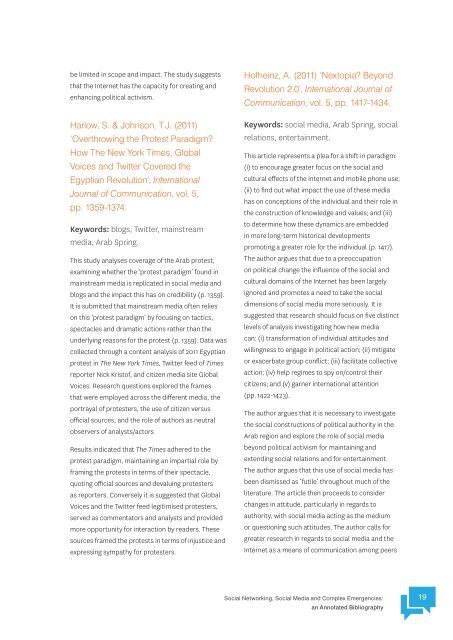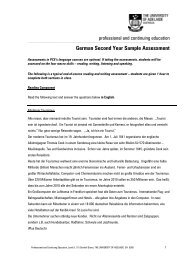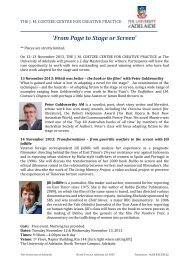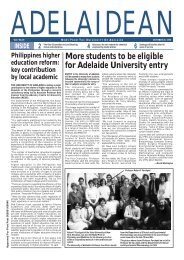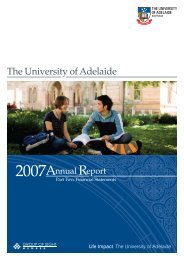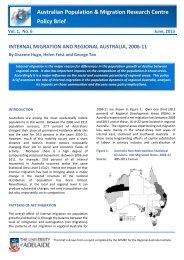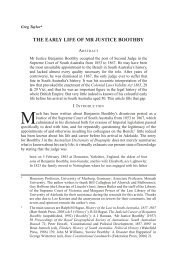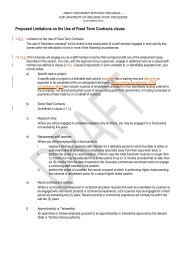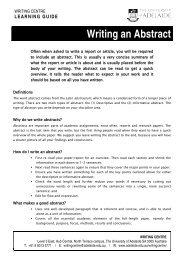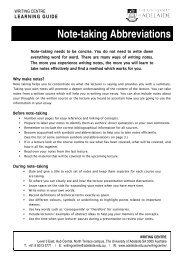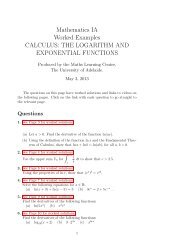Social Networking, Social Media and Complex Emergencies: an ...
Social Networking, Social Media and Complex Emergencies: an ...
Social Networking, Social Media and Complex Emergencies: an ...
You also want an ePaper? Increase the reach of your titles
YUMPU automatically turns print PDFs into web optimized ePapers that Google loves.
e limited in scope <strong><strong>an</strong>d</strong> impact. The study suggests<br />
that the Internet has the capacity for creating <strong><strong>an</strong>d</strong><br />
enh<strong>an</strong>cing political activism.<br />
Harlow, S. & Johnson, T.J. (2011)<br />
‘Overthrowing the Protest Paradigm?<br />
How The New York Times, Global<br />
Voices <strong><strong>an</strong>d</strong> Twitter Covered the<br />
Egypti<strong>an</strong> Revolution’, International<br />
Journal of Communication, vol. 5,<br />
pp. 1359-1374.<br />
Keywords: blogs, Twitter, mainstream<br />
media, Arab Spring.<br />
This study <strong>an</strong>alyses coverage of the Arab protest,<br />
examining whether the ‘protest paradigm’ found in<br />
mainstream media is replicated in social media <strong><strong>an</strong>d</strong><br />
blogs <strong><strong>an</strong>d</strong> the impact this has on credibility (p. 1359).<br />
It is submitted that mainstream media often relies<br />
on this ‘protest paradigm’ by focusing on tactics,<br />
spectacles <strong><strong>an</strong>d</strong> dramatic actions rather th<strong>an</strong> the<br />
underlying reasons for the protest (p. 1359). Data was<br />
collected through a content <strong>an</strong>alysis of 2011 Egypti<strong>an</strong><br />
protest in The New York Times, Twitter feed of Times<br />
reporter Nick Kristof, <strong><strong>an</strong>d</strong> citizen media site Global<br />
Voices. Research questions explored the frames<br />
that were employed across the different media, the<br />
portrayal of protesters, the use of citizen versus<br />
official sources, <strong><strong>an</strong>d</strong> the role of authors as neutral<br />
observers of <strong>an</strong>alysts/actors<br />
Results indicated that The Times adhered to the<br />
protest paradigm, maintaining <strong>an</strong> impartial role by<br />
framing the protests in terms of their spectacle,<br />
quoting official sources <strong><strong>an</strong>d</strong> devaluing protesters<br />
as reporters. Conversely it is suggested that Global<br />
Voices <strong><strong>an</strong>d</strong> the Twitter feed legitimised protesters,<br />
served as commentators <strong><strong>an</strong>d</strong> <strong>an</strong>alysts <strong><strong>an</strong>d</strong> provided<br />
more opportunity for interaction by readers. These<br />
sources framed the protests in terms of injustice <strong><strong>an</strong>d</strong><br />
expressing sympathy for protesters.<br />
Hofheinz, A. (2011) ‘Nextopia? Beyond<br />
Revolution 2.0’, International Journal of<br />
Communication, vol. 5, pp. 1417-1434.<br />
Keywords: social media, Arab Spring, social<br />
relations, entertainment.<br />
This article represents a plea for a shift in paradigm:<br />
(i) to encourage greater focus on the social <strong><strong>an</strong>d</strong><br />
cultural effects of the Internet <strong><strong>an</strong>d</strong> mobile phone use;<br />
(ii) to find out what impact the use of these media<br />
has on conceptions of the individual <strong><strong>an</strong>d</strong> their role in<br />
the construction of knowledge <strong><strong>an</strong>d</strong> values; <strong><strong>an</strong>d</strong> (iii)<br />
to determine how these dynamics are embedded<br />
in more long-term historical developments<br />
promoting a greater role for the individual (p. 1417).<br />
The author argues that due to a preoccupation<br />
on political ch<strong>an</strong>ge the influence of the social <strong><strong>an</strong>d</strong><br />
cultural domains of the Internet has been largely<br />
ignored <strong><strong>an</strong>d</strong> promotes a need to take the social<br />
dimensions of social media more seriously. It is<br />
suggested that research should focus on five distinct<br />
levels of <strong>an</strong>alysis investigating how new media<br />
c<strong>an</strong>: (i) tr<strong>an</strong>sformation of individual attitudes <strong><strong>an</strong>d</strong><br />
willingness to engage in political action; (ii) mitigate<br />
or exacerbate group conflict; (iii) facilitate collective<br />
action; (iv) help regimes to spy on/control their<br />
citizens; <strong><strong>an</strong>d</strong> (v) garner international attention<br />
(pp. 1422-1423).<br />
The author argues that it is necessary to investigate<br />
the social constructions of political authority in the<br />
Arab region <strong><strong>an</strong>d</strong> explore the role of social media<br />
beyond political activism for maintaining <strong><strong>an</strong>d</strong><br />
extending social relations <strong><strong>an</strong>d</strong> for entertainment.<br />
The author argues that this use of social media has<br />
been dismissed as ‘futile’ throughout much of the<br />
literature. The article then proceeds to consider<br />
ch<strong>an</strong>ges in attitude, particularly in regards to<br />
authority, with social media acting as the medium<br />
or questioning such attitudes. The author calls for<br />
greater research in regards to social media <strong><strong>an</strong>d</strong> the<br />
Internet as a me<strong>an</strong>s of communication among peers<br />
<strong>Social</strong> <strong>Networking</strong>, <strong>Social</strong> <strong>Media</strong> <strong><strong>an</strong>d</strong> <strong>Complex</strong> <strong>Emergencies</strong>:<br />
<strong>an</strong> Annotated Bibliography<br />
19


